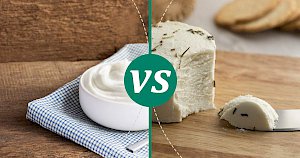Goat Cheese vs Greek Yoghurt: Calories & Nutrition Showdown


Goat cheese vs Greek yoghurt
Nutrition Facts
Serving size:
change
5g10g15g20g30g40g50g60g80g100g120g140g160g180g200g220g250g300g350g400g450g500g600g700g800g900g1000g
1oz2oz3oz4oz5oz6oz7oz8oz10oz12oz15oz20oz25oz30oz35oz40oz50oz
Amount Per Serving:
Serving size:
change
5g10g15g20g30g40g50g60g80g100g120g140g160g180g200g220g250g300g350g400g450g500g600g700g800g900g1000g
1oz2oz3oz4oz5oz6oz7oz8oz10oz12oz15oz20oz25oz30oz35oz40oz50oz
Amount Per Serving:
Goat Cheese vs Greek Yoghurt 100g Compare
| per 100g | Goat cheese | Greek yoghurt |
|---|---|---|
| Calories | 364 | 59 |
| Carbohydrates | 0.12 g | 3.6 g |
| Fat | 29.84 g | 0.39 g |
| Protein | 21.58 g | 10.19 g |
| Water | 45.52 g | 85.1 g |
| Calcium | 298 mg | 110 mg |
| Iron | 1.62 mg | 0.07 mg |
| Magnessium | 29 mg | 11 mg |
| Phosphorus | 2.5 mg | 1 mg |
| Potassium | 158 mg | 141 mg |
| Sodium | 415 mg | 36 mg |
| Zink | 2.5 mg | 1 mg |
| Vitaminium A | 1464 µg | 4 µg |
| Vitaminium B1 (Thiamine) | 0.072 mg | 0.023 mg |
| Vitaminium B2 (riboflavin) | 0.676 mg | 0.278 mg |
| Vitaminium B3 (Niacin) | 1.148 mg | 0.208 mg |
| Vitaminium B6 | 0.06 mg | 0.063 mg |
| Vitaminium B9 (Folic acid) | 0.002 mg | 0.007 mg |
| Vitaminium E | 0.26 mg | 0.01 mg |
When it comes to choosing between goat cheese and Greek yogurt, many might find themselves at a crossroads. Both offer unique flavors and textures, making them beloved by food enthusiasts worldwide. But beyond their taste, these dairy products are packed with nutritional benefits that cater to various dietary needs and preferences. Let's dive into the fascinating worlds of goat cheese and Greek yogurt, uncovering their nutritional profiles, health benefits, and culinary uses to help you make an informed choice for your next meal.
A Closer Look at Goat Cheese
Goat cheese, also known as chèvre, boasts a rich history that dates back thousands of years. Originating from regions in France, this creamy and tangy cheese has won the hearts of many. Made from goat's milk, it stands out not only for its distinctive flavor but also for its easier digestibility compared to cow's milk products. This is due to the smaller fat globules and different protein structure in goat's milk. Nutritionally, goat cheese is a powerhouse, offering a high content of calcium, phosphorus, and essential vitamins such as vitamin A and D.
Greek Yogurt: A Creamy Delight
Greek yogurt, on the other hand, is celebrated for its thick, creamy texture and slightly tart taste. It's made by straining regular yogurt to remove the whey, resulting in a product that's denser in nutrients. Greek yogurt is a versatile ingredient, perfect for both sweet and savory dishes. It's an excellent source of protein, probiotics, and calcium, making it a favorite among health-conscious individuals. Additionally, its high protein content makes it a great option for those looking to increase their intake for muscle building or weight management.
Nutritional Face-Off
When comparing the nutritional content of goat cheese and Greek yogurt, it's clear that both offer unique benefits. Goat cheese is higher in calories and fat, including saturated fat, but it also provides more calcium, iron, and magnesium. This makes it a good choice for those looking to boost their intake of these minerals. On the other hand, Greek yogurt stands out for its lower calorie and fat content, making it a lighter option. It's also higher in protein and contains probiotics that support gut health.
Health Benefits Galore
Both goat cheese and Greek yogurt are more than just tasty additions to your diet; they offer several health benefits. Goat cheese's high calcium content is beneficial for bone health, while its fatty acids can improve heart health. Greek yogurt's probiotics can enhance digestive health and boost the immune system. Moreover, the high protein content in Greek yogurt can aid in weight management by promoting satiety and muscle repair.
Culinary Creations
When it comes to culinary uses, both goat cheese and Greek yogurt are incredibly versatile. Goat cheese can be crumbled over salads, melted into pasta dishes, or even spread on a warm piece of toast. Its creamy texture and tangy flavor make it a delightful addition to many recipes. Greek yogurt can be used as a healthier alternative to sour cream, mixed into smoothies, or served with fruit and honey for a delicious breakfast or snack. Its thick texture also makes it ideal for creating creamy sauces and dips.
Final Thoughts
Choosing between goat cheese and Greek yogurt ultimately comes down to personal preference and dietary needs. Whether you're drawn to the rich, tangy flavor of goat cheese or the creamy, nutritious profile of Greek yogurt, both options can be a healthy and delicious part of your diet. By understanding their nutritional content, health benefits, and culinary uses, you can enjoy these dairy delights to their fullest, adding both variety and nutrition to your meals.
Goat cheese 100g
364kcalCalories source
- 0% CARBS.
- 24% PROTEIN
- 76% FAT
Greek yoghurt 100g
59kcalCalories source
- 25% CARBS
- 69% PROTEIN
- 6% FAT
Compares of goat cheese
- Goat Cheese vs Brie
- Goat Cheese vs Cottage Cheese
- Goat Cheese vs Feta Cheese
- Goat Cheese vs Gouda Cheese
- Goat Cheese vs Parmesan
- Goat Cheese vs Swiss Cheese
- see all compares of goat cheese
Marcin Piotrowicz
calories-info.com creator
Healthy diet and healthy lifestyle promoter
Add comment